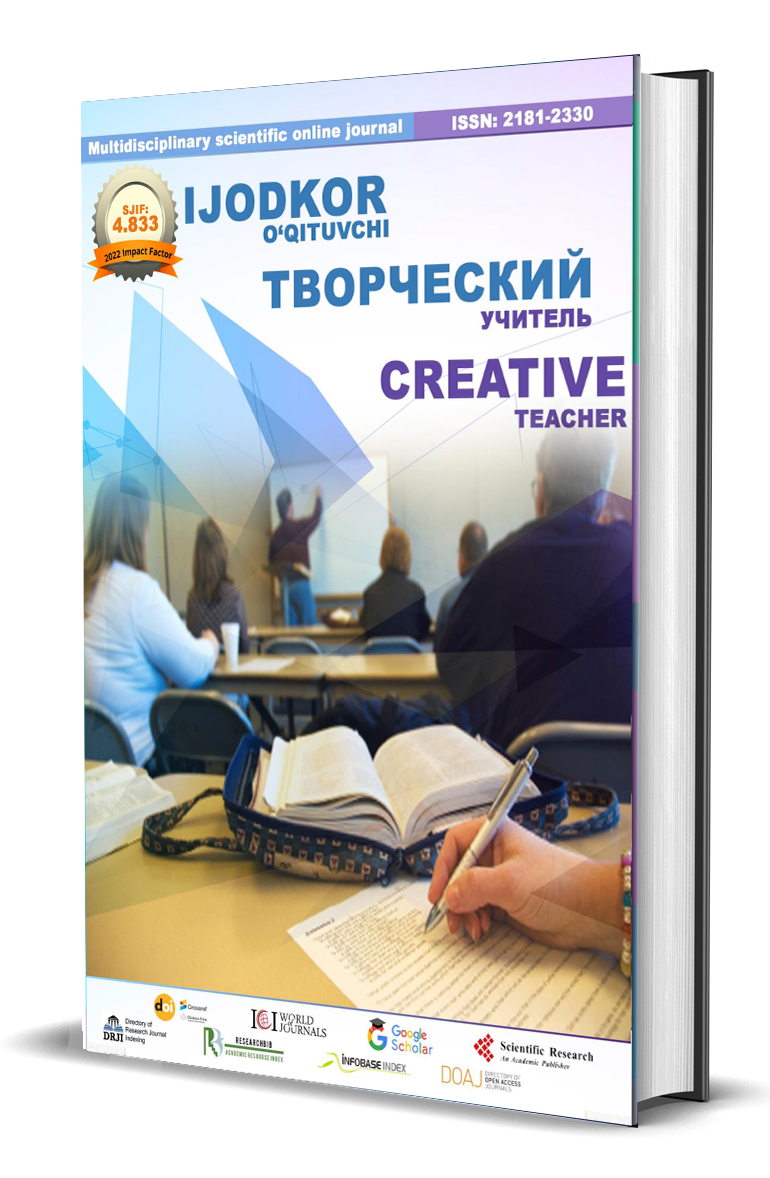THEORETICAL AND METHODOLOGICAL FOUNDATIONS FOR DEVELOPING INFORMATION-ANALYTICAL COMPETENCE IN FUTURE TEACHERS
Keywords:
axboriy-analitik kompetentlik, bo‘lajak o‘qituvchilar, ta’lim, nazariy-metodologik asoslar, pedagogik yondashuvlar.Abstract
Ushbu maqolada bo‘lajak o‘qituvchilarda axboriy-analitik kompetentlikni rivojlantirishning nazariy va metodologik asoslari o‘rganilgan. Maqolada axboriy-analitik kompetentlikning ahamiyati, uning tarkibiy qismlari va o‘qituvchilarni tayyorlashda ushbu kompetentlikni shakllantirishning zamonaviy pedagogik yondashuvlari tahlil qilingan. Shuningdek, ta'lim jarayonida axboriy-analitik kompetentlikni rivojlantirishning samarali usullari va texnologiyalari haqida fikr yuritiladi.
References
1. Abduhamidov, A. (2021). Pedagogical Approaches to Developing Analytical Skills in Future Teachers. Tashkent: Pedagogical Institute Press, p. 68.
2. Altun, M. (2019). The Role of Information Competency in Educational Leadership. Journal of Educational Technology & Society, 22(4), pp. 30-42.
3. Anderson, L. W., & Krathwohl, D. R. (Eds.). (2001). A Taxonomy for Learning, Teaching, and Assessing: A Revision of Bloom's Taxonomy of Educational Objectives. New York: Longman, p. 352.
4. Anisimov, V. I. (2015). Modern Approaches to the Development of Analytical Competence in Education. Moscow: Nauka Publishers, p. 214.
5. Askarov, D. M. (2017). Information and Analytical Competence in the Context of Lifelong Learning. Samarkand: University Press, p. 102.
6. Bruner, J. S. (1960). The Process of Education. Cambridge, MA: Harvard University Press, p. 97.
7. Burkhardt, J. M. (2010). Teaching Information Literacy: 50 Standards-Based Exercises for College Students. American Library Association, p. 120.
8. Dewey, J. (1938). Experience and Education. New York: Macmillan, p. 91.
9. Hattie, J. (2009). Visible Learning: A Synthesis of Over 800 Meta-Analyses Relating to Achievement. Routledge, p. 392.
10. Kolb, D. A. (1984). Experiential Learning: Experience as the Source of Learning and Development. Prentice-Hall, p. 256.
11. Krashen, S. D. (1982). Principles and Practice in Second Language Acquisition. Pergamon Press, p. 202.
12. Piaget, J. (1970). Genetic Epistemology. Columbia University Press, p. 86.
13. Shulman, L. S. (1987). Knowledge and Teaching: Foundations of the New Reform. Harvard Educational Review, 57(1), pp. 1-22.
14. Sidorina, N. A. (2018). Integrating Modern Technology into the Classroom: Enhancing Comprehensibility and Motivation. Journal of Modern Education Review, 8(12), pp. 938-945.
15. Tomlinson, C. A. (2001). How to Differentiate Instruction in Mixed-Ability Classrooms. ASCD, p. 128.
16. Vygotsky, L. S. (1978). Mind in Society: The Development of Higher Psychological Processes. Harvard University Press, p. 159.
17. Xatamov, U. (2020). Development of Analytical Thinking in Future Teachers. Bukhara: State University Press, p. 111.
18. Yuldashev, K. (2019). Information Competency in the Digital Age. Tashkent: Ilmiy Nashriyot, p. 84.




